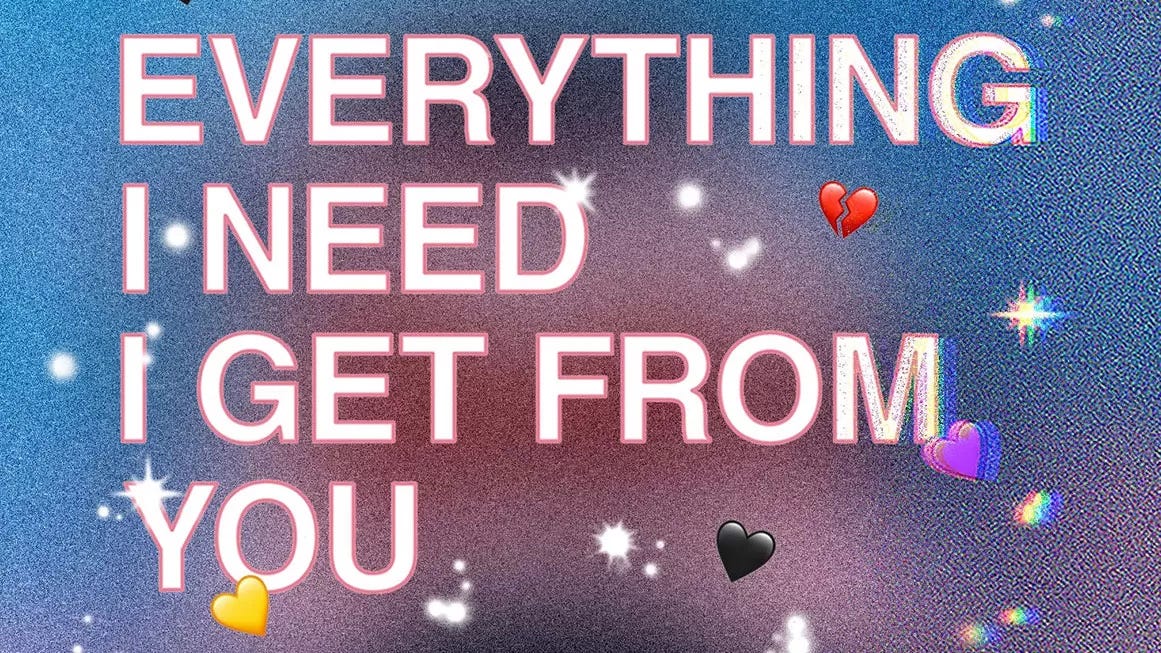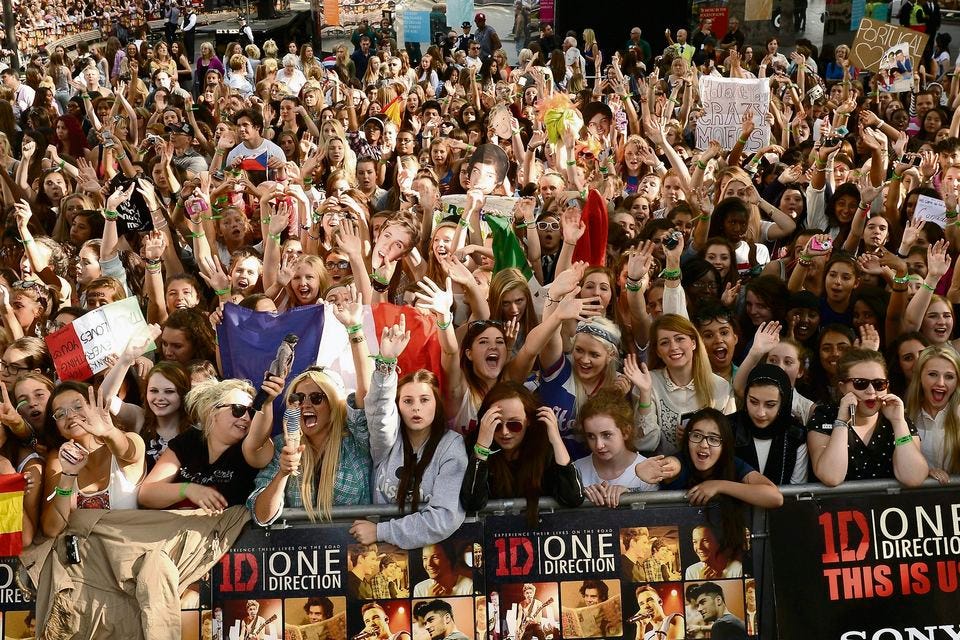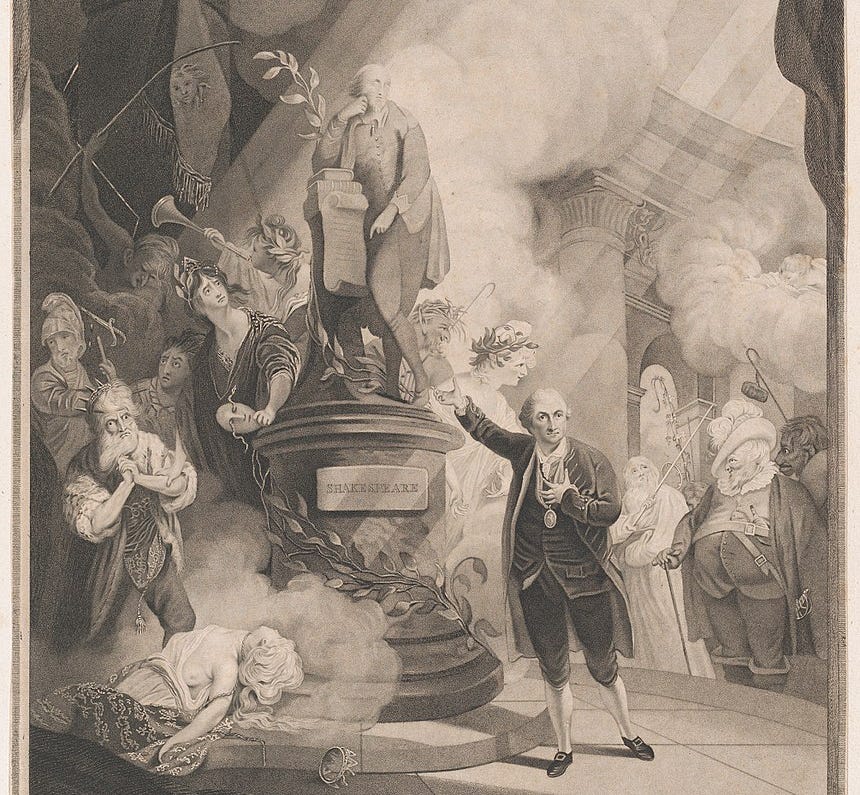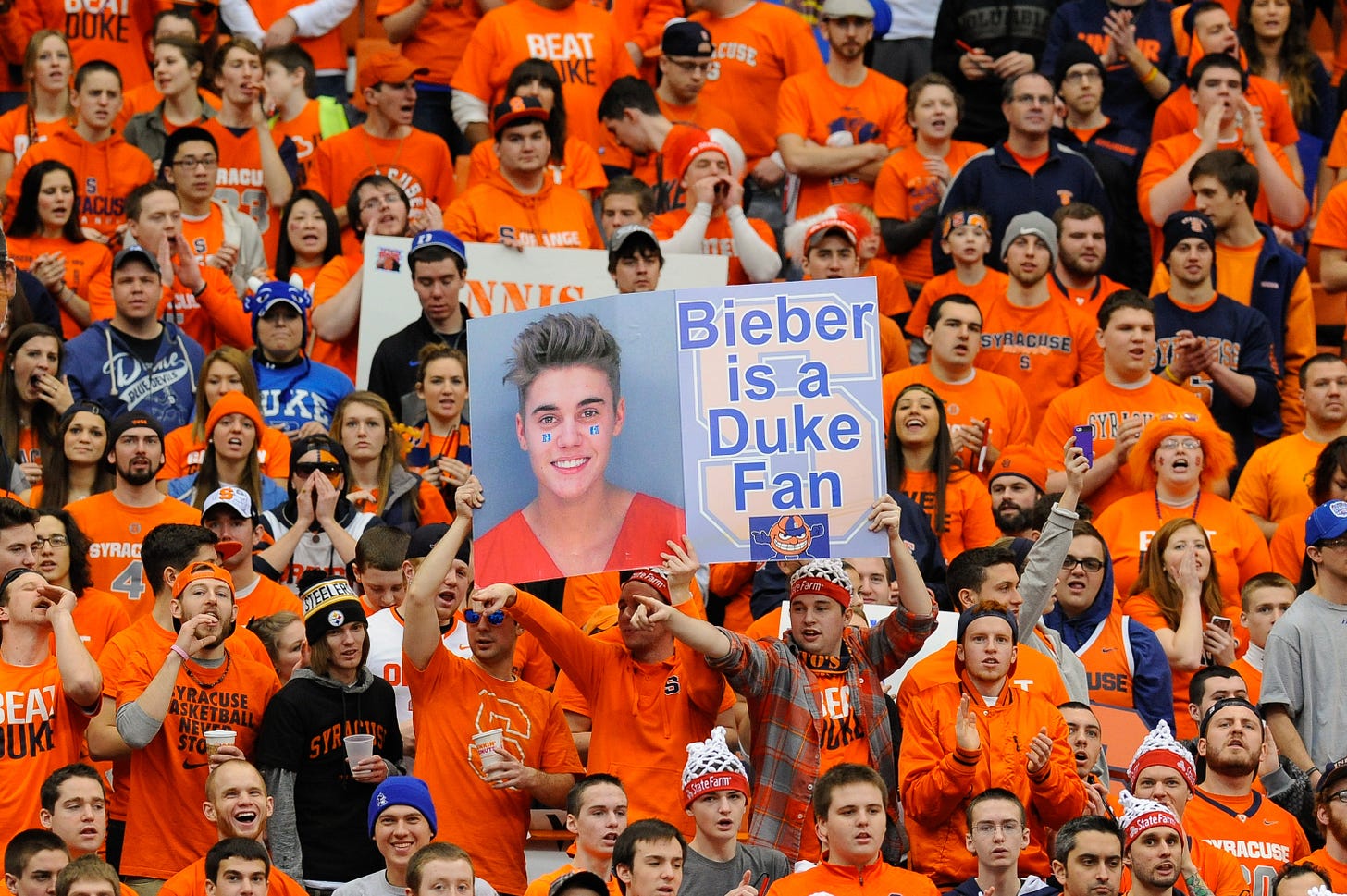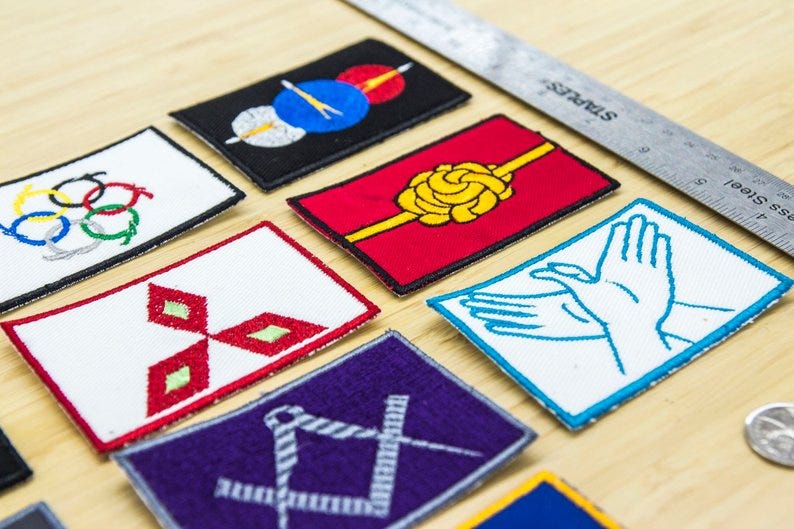"Everything I Need I Get From You: How Fangirls Created the Internet as We Know It," by Kaitlyn Tiffany (2022)
Make a little birdhouse in your soul
Finished "Everything I Need I Get From You."
1. What is this book supposedly about?
Only a critic who's given up the ghost would use the phrase "This is a special book" to open a review. Under the common law, that line is punishable by the stocks and bastinado. Yet the inconvenient fact remains that rarely--almost never, but yes, sometimes--it's the only line to start with. So, yes then: this is a special book.
Kaitlyn Tiffany is ostensibly writing a short cultural history of a particular Internet fandom. Her topic is the cult following of the British boy band "One Direction." 1D, to use the abbreve, was a calculated commercial venture from the get up and go. Let's quote the sentence-sized history favored by the New York Times: the group was "cynically assembled for the reality television competition 'The X Factor' in 2010, and went on to release five albums of catchy if unremarkable pop songs before going on indefinite hiatus in 2016." One Direction is the reason Harry Styles became, as the youngs say, a thing.
The most remarkable thing about 1D's short life was not its music, personnel, or cultural impact, but its fans--as a group, they gelled together into a uniquely powerful, disproportionately influential, unspeakably labyrinthine-minded, and shockingly knowledgeable crew. If you do not care for boy band music, but have heard/have opinions on/know memes about 1D, their fans ("Directioners") are the likely reason why. They hunted, and still hunt, the white whale.
This, at any rate, is what you'd read from any good synopsis online: Tiffany's book is a detailed but clear-eyed examination of 1D devotees. All well and good.
But this book's not about One Direction. Not really. What's happening here, Mr. Jones?
2. Well then, what is this book actually about?
Tiffany has greater ambitions. She is using 1D, and specifically the Directioner community, to say something profound about the nature of human devotion and how it intersects socialization online.
Tiffany would likely not put it that way. The author quietly walks around her central idea, stalking her prey indirectly. But at the end of the day, her central notion is this: 1D's fans are not followers. They are essentially co-creators -- perhaps even the creators -- of the entire cultural and musical phenomenon of One Direction. There is anecdote upon anecdote of how Directioners created narratives, boosted record sales, advanced certain conversations and hindered others. She details moments which inspire and incidents that nauseate. You will be delighted by the story of a fan that made a highway shrine where Harry Styles puked. And then, several pages later, you can be repulsed that a huge segment of 1D fandom believes band member Liam Tomlinson's very real human child is a publicity stunt to cover up a secret romance, and that said fans have harassed Liam and Harry about it for years.
There is a shocking moment for the reader of “Everything I Need I Get From You” when you realize the actual intents of the band are really secondary to what the fans want. The fans are not beguiled, and certainly not puppeted. Oh no, quite the opposite. The audience is listening; the audience is in control.
Once we acknowledge this about 1D fandom, that what we call "One Direction" is the creation of fans and not the band—it opens certain doors. Avenues of inquiry. We could apply this argument to any fandom. Or any mass-consumed cultural artifact (in entertainment, media, or politics).
Aren't all fans doing what 1D fandom did? Using the space of fandom to create communities and affirm shared consensus realities? Such communities create the cultural artifacts of Taylor Swift, Ariana Grande, Batman, Michael Phelps, the late Richard Nixon, the even later Seabiscuit, Coldplay, Hoobastank, and Star Trek.
Don’t stop at modernity, either: every Shakespeare obsessive (hi! it's me) knows that Shakespeare did not become Shakespeare until the 18th century; he had nothing to do with Bardolatry. The fans did.
Ms. Swift wrote her songs and sang them. She worked hard to cultivate an image. A brand. Nobody doubts this. But I submit to you that what you and I think of as "Taylor Swift" -- her persona, her power, her cultural influence and centrality in the monoculture -- is really a phenomenon summoned up by the audience. Likewise, when I think of Star Wars, I am not really thinking of what George Lucas quickly wrote on a legal pad in 1973. The totality of the cultural phenomenon of “Star Wars” is not just the work of actors, technicians, and John Williams. It is a decades-long interaction between countless millions and the companies selling the goods, and I would suggest the fans have the upper hand in that conversation. All the creator does is dangle their wares on a line. The audience decides whether or not to bite.
And so it is the fandom, the subculture around a Swift or Shakespeare or a Star Wars, which surrounds, supports, and dictates what is relevant. To assume otherwise is to get the world upside-down; to believe that creators create alone in a void is the same as thinking that generals win wars. But they don't, of course. Soldiers do.
If Tiffany's argument (and my interpretation of the argument) is correct, then all George Lucas or the moneymen behind 1D did was plant a seed. The fruit was grown and plucked by other hands. By fans.
3. What does it mean to be a fan?
And there's that word again: fan. There's a word to conjure by. Think about that three-letter noun for a second. What image does it create in your mind? People screaming. Thoughtless devotion. And so on. Not at all flattering. But Tiffany thinks we've got them all wrong.
Fandom has existed for a very long time, in one form or the other. But it reached its fullest flower with the advent of the Internet. Directioners, in the author's telling, are simply the purest manifestation of modern fandom. If we want to understand fans, 1D followers are a first-rate place to start.
So why is 1D fandom so special? Because it's an Internet fandom. That means 1D fandom is liberated in a way the mid-Sixties Beatles lovers never were. Directioners have a deeper pool of knowledge, greater surveillance of the band, digital recording, social media posts; 1D fans can communicate instantly with one another, cite other posters. They are more savvy about media, economics, and pop culture.
But the real difference is that modern Internet fandom has gone beyond interpreters and gatekeepers. Let's be frank about this. Most mid-century analyses of fandom were written by sanctimonious and patronizing media commentators. Go and read any description of the Beatles fans from 1964-65 and see what I mean. But don't stop in the Sixties; go back to the 19th century. Even then, you'll notice the same lazy tropes applied to devotees of popular art: they are silly, they are confused, they are immature, and so on.
The Internet gutted these middlemen. The global, digitized audience could now see fans and experience fandom without the intermediaries. You didn't need CNN to do a story about Twilight addicts--they were a click away. Fans themselves were no longer segmented into black-and-white Xeroxed zines, but able to speak to other fans (and other Internet users) via the multiplying platforms of the 2000s and 2010s. Niche cultures met global audiences.
And there's the difference. When actual fans are seen face to face, the impression is less a vision of an untampered animal id ... and more like a sophisticated, self-aware obsessiveness. In reality? Fans are snarky lovers.
Let me quote again from Amanda Hess' wonderfully insightful NYT review, which sums up the author's findings so very well:
Tiffany counts herself as a fan (she is the same age as Harry Styles, the band’s youngest member), though she approaches her subject with a wry critical distance — which is actually, she argues, an underappreciated but common fan characteristic. It is a persistent sexist attitude that flattens the fangirl’s perspective into inarticulate shrieking. “Though the criticism of fangirls is that they become tragically selfless and one-track-minded,” Tiffany writes, “the evidence available everywhere I look is that they become self-aware and creatively free.” She argues that One Direction’s blandly corporate beginnings formed an inviting blank canvas for the band’s fans, who marshaled their generative powers to challenge the music industry’s scripts about what women and girls want — or simply to amuse themselves.
According to Tiffany (and oral history), most of the girls screaming for Elvis, the Beatles, or Springsteen, were screaming not for the band ... but for life itself. An affirmation of the experience of being alive, of experiencing whatever the band was selling.
What was being pursued, in other words, was not some repressed urge, but the feeling of love and participation. Being a fan does not mean blind worship or acceptance, and never really did. It means this thing is meaningful to you, and you desire ownership or participation in it.
The world of 2024 is a strange place. We can say this without being cynical: even those who don't believe in anything believe in the validating power of celebrity. Fame and relevance are the universal currency, far more than the dollar. But to win enduring fame, you must have fans.
That means the stamp of fandom, the inherent validation of believing in a thing that other people believe in, is something that is indisputably real and true–or it has the effect of something real and true, which is practically the same thing. In this way, fandom is no different from government. The government only exists to the extent we believe in it. As the philosopher David Hume wrote in 1777:
“It is therefore, on opinion only that government is founded; and this maxim extends to the most despotic and most military governments, as well as to the most free and most popular.”
You may not like your particular government, your town, or your culture. You may see the people who believe in these things as misapplying their faith. But if you have a fandom, you have a larger whole to belong to. For a lot of people, fandom provides community, earnest belief in something, shared values, inside jokes, people to stand for and with--all kinds of medicine to the soul. Fandom can seem like one of the few unbroken social contracts.
4. What does it all mean?
Tiffany's book feeds into my theory that in the future, as the nation state withers away, what we're going to see is human societies organized around fandoms. It won't be called that, of course, but that's essentially what it'll be. Organized groups of people cleaving to a single idea or person or aesthetic form. These imperial fandoms, operating in dispersed solidarity, will exercise power commercial and otherwise over the affairs of the world.
I'm not the only person with this idea. There is a quartet of sci-fi novels by Ada Palmer, the "Terra Ignota" series which prophesies this. Set in the 22nd century, the Terra Ignota world is dominated not by countries but "Hives," essentially giant clubs with voluntary citizenship. They are not tied to geography or ethnic bonds. Hives fulfill the same purpose as the nation-state: each one has its own unique form of government, habits, headquarters, rules, and so on. The Cousins are if non-profits became a nation, the Masonic Empire is what would happen if Mason Lodges were a state, the Humanists are fans of individualized achievement. Fandoms, in other words.
A reader even made patches for them:
But Terra Ignota is also about war between the Hives. Which leads to another question: our fandoms are not all the same, are they? Do we have to respect other people's fandoms?
To the extent we respect the nation-state, perhaps. I neither like nor dislike 1D. My feelings toward them are null, similar to how a medieval herdsman might feel about the "Fast and Furious" movies. I understand 1D's appeal, but my business and theirs have no intersections or cross purposes. All my king's horses and men are elsewhere.
What earns my respect is not the band itself, but the fans. That's sensible. I may not like the government of Italy, but I take Italians seriously. Same with Directioners. They are the most serious, most lasting, and for lack of a better term, the most real aspect of "One Direction." 1D was built in calculation; the 1D fandom was thrown together out of love.
This is hardly new though, is it? The world is filled with people who have beliefs we do not share. Whether you have a religion (or don't), you almost certainly have a considered opinion about the rest of the world's believers. You may not share the tenets of a faith. But you are aware that millions of decent people do believe them, and even if you don't favor the faith, you recognize the lived reality of the faithful. Perhaps it is the believers that hallow the object of devotion, as much as the object itself. Everything we need we get from we.


